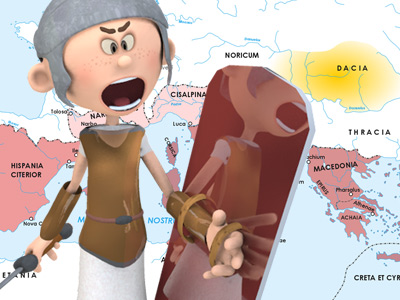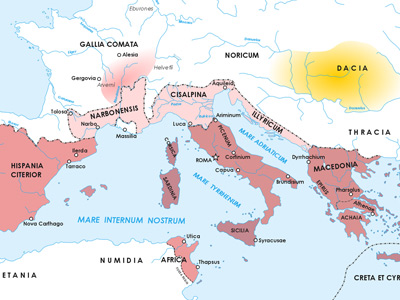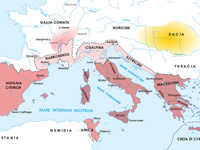Caesar was later proclaimed dictator first for ten years and then in perpetuity. The latter arrangement in openly doing away with a term limit, triggered the conspiracy leading to his assassination on the Ides of March in 44 BC out of such fears. Following this, Antony and Caesar's adopted son Octavius (later Caesar Augustus) had to fight yet another civil war against remnants of the Optimates and Liberatores faction, who were crushed by the skill of Marcus Antonius, who was able to defeat his two main opponents, and Octavius, despite having his camp overrun, evaded capture.
-
Outline of the Great Roman Civil War (49–45 BC)

HISTORIC BATTLES
Great Roman Civil War (49–45 BC)
The Great Roman Civil War (49–45 BC), also known as Caesar's Civil War, was one of the last politico-military conflicts in the Roman Republic before the establishment of the Roman Empire. It began as a series of political and military confrontations, between Julius Caesar (100–44 BC), his political supporters, and his legions, against the Optimates (or Boni), the politically conservative and socially traditionalist faction of the Roman Senate, who were supported by Pompey (106–48 BC) and his legions. View Historic Battle »
Pre-war politico–military situation: Caesar's Civil War resulted from the long political subversion of the Roman Government's institutions, begun with the career of Tiberius Gracchus, continuing with the Marian reforms of the legions, the bloody dictatorship of Lucius Cornelius Sulla, and completed by the First Triumvirate over Rome.
Crossing the Rubicon: On 10 January 49 BC, leading one legion, the Legio XIII Gemina, General Julius Caesar crossed the Rubicon River, the boundary between the Cisalpine Gaul province to the north and Italy proper to the south, a legally proscribed action forbidden to any army-leading general.
March on Rome and the early Hispanian campaign: Caesar's march on Rome was a triumphal progress. The Senate, not knowing that Caesar possessed only a single legion, feared the worst and supported Pompey.
Greek, Illyrian and African campaigns: A major reason for Pompey's defeat was a miscommunication among front cavalry horsemen.
Egyptian dynastic struggle: Pompey fled to Egypt, where he was murdered by an officer of King Ptolemy XIII.
War against Pharnaces: After this show of strength against the Romans, Pharnaces drew back to suppress revolt in his new conquests.
Later campaign in Africa and the war on Cato: While Caesar had been in Egypt installing Cleopatra as Queen, four of his veteran legions encamped outside of Rome under the command of Mark Antony.
Second Hispanian campaign and the end of the war: Caesar gave chase and defeated the last remnants of opposition in the Battle of Munda in March 45 BC.
Aftermath: Caesar was later proclaimed dictator first for ten years and then in perpetuity.

Great Roman Civil War (49–45 BC)
The Great Roman Civil War (49–45 BC), also known as Caesar's Civil War, was one of the last politico-military conflicts in the Roman Republic before the establishment of the Roman Empire. It began as a series of political and military confrontations, between Julius Caesar (100–44 BC), his political supporters (broadly known as Populares), and his legions, against the Optimates (or Boni), the politically conservative and socially traditionalist faction of the Roman Senate, who were supported by Pompey (106–48 BC) and his legions.
- Pre-war politico–military situation
- Crossing the Rubicon
- March on Rome and the early Hispanian campaign
- Greek, Illyrian and African campaigns
- Egyptian dynastic struggle
- War against Pharnaces
- Later campaign in Africa and the war on Cato
- Second Hispanian campaign and the end of the war
- Aftermath




RESOURCES
This article uses material from the Wikipedia article "Caesar's Civil War", which is released under the Creative Commons Attribution-Share-Alike License 3.0.
© Stories Preschool. All Rights Reserved.
"Building Cool Educational Stuff for children and adults!"


Historic Battles
Wars and military campaigns are guided by strategy, whereas battles take place on a level of planning and execution known as operational mobility.
View Historic Battles »


Historic People
A historical figure is a famous person in history, such as Alexander the Great, Admiral Yi Sun-Shin, Abraham Lincoln, George Washington, Christopher Columbus, or Napoleon Bonaparte.
View Historic People »


Historic Timeline
Describes the history of humanity as determined by the study of archaeological and written records. Ancient recorded history begins with the invention of writing.
View Historic Timeline »

Historic Legends
Beings in myths are generally gods and goddesses, heroes and heroines, or animals and plants. Most myths are set in a timeless past before recorded time or beginning of the critical history.
View Historic Legends »

Sports World
Includes competitive games which, through casual or organized participation, aim to use, maintain or improve physical ability and skills while providing enjoyment to participants.
View Sports World »

Untold Stories
If you have any questions, feedback or suggestions for us, we'd like to hear from you. Please feel free to contact us!
Contact Us

Historic Battles
Wars and military campaigns are guided by strategy, whereas battles take place on a level of planning and execution known as operational mobility.
View Historic Battles »

Historic People
A historical figure is a famous person in history, such as Alexander the Great, Admiral Yi Sun-Shin, Abraham Lincoln, George Washington, Christopher Columbus, or Napoleon Bonaparte.
View Historic People »

Historic Timeline
Describes the history of humanity as determined by the study of archaeological and written records. Ancient recorded history begins with the invention of writing.
View Historic Timeline »

Historic Legends
Beings in myths are generally gods and goddesses, heroes and heroines, or animals and plants. Most myths are set in a timeless past before recorded time or beginning of the critical history.
View Historic Legends »

Sports World
Includes competitive games which, through casual or organized participation, aim to use, maintain or improve physical ability and skills while providing enjoyment to participants.
View Sports World »

Untold Stories
If you have any questions, feedback or suggestions for us, we'd like to hear from you. Please feel free to contact us!
Contact Us
Historic Battles
Wars and military campaigns are guided by strategy, whereas battles take place on a level of planning and execution known as operational mobility.
View Historic Battles »

Historic People
A historical figure is a famous person in history, such as Alexander the Great, Admiral Yi Sun-Shin, Abraham Lincoln, George Washington, Christopher Columbus, or Napoleon Bonaparte.
View Historic People »

Historic Timeline
Describes the history of humanity as determined by the study of archaeological and written records. Ancient recorded history begins with the invention of writing.
View Historic Timeline »

Historic Legends
Beings in myths are generally gods and goddesses, heroes and heroines, or animals and plants. Most myths are set in a timeless past before recorded time or beginning of the critical history.
View Historic Legends »

Sports World
Includes competitive games which, through casual or organized participation, aim to use, maintain or improve physical ability and skills while providing enjoyment to participants.
View Sports World »

Untold Stories
If you have any questions, feedback or suggestions for us, we'd like to hear from you. Please feel free to contact us!
Contact Us